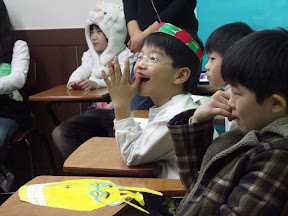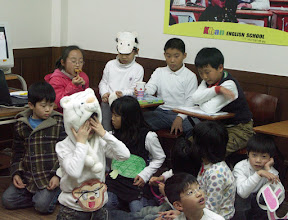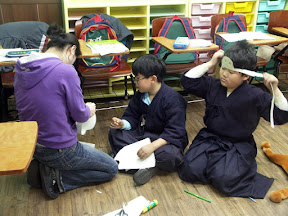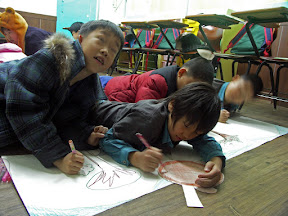After finishing my first full week in a Korean classroom, I thought it was about time to write about my teaching experience so far. As with any job, I'm sure my feelings towards this one will yo-yo wildly over the course of the year, but I wanted to get down a few initial impressions.
My school is a hagwon - a private academy that children attend in addition to their regular schools - in Anmin, a small suburb of Changwon. It's a franchise of Khan English, which is, as far as I can tell, quite a big name in Korea, with its own range of course materials. The Khan method seems to consist almost entirely of chanting small snippets of dialogue at an increasingly frantic pace. The books and CDs advocate the 'one breath training' method - cramming as many words as possible into a single expectoration of English, until all meaning is lost.
I've only used them in desperation, but there's something quite hypnotic about the Khan CDs, which employ two actors with mid-American accents and a range of wild and wacky voices. There's also a smattering of jaunty music - sometimes accompanying the chanting - and DVDs featuring a variety of talking heads with extremely unfortunate hair.
Rather frustratingly, the Khan books and other materials get less interesting as the students progress - elementary school kids get a variety of sorting, writing and drawing tasks to accompany their chanting; middle school students receive only translation and stripped-down intonation to keep them interested. So far I haven't really been encouraged to find or create any additional materials for these lessons, but I've found it a necessity with the older groups, who aren't exactly well-disposed to speak at all, let alone repeat the same phrases for minutes on end.
Thankfully the most advanced groups are given non-Khan course materials, which are generally more varied, interesting and challenging. I've found some of these lessons very satisfying, but most of the teenagers are, predictably, the students least inclined to put in any more than the minimum amount of effort. As a result, I've unexpectedly been most enjoying lessons with the younger groups, probably because they've got a little more energy, and I can get them to do their chanting in a variety of silly ways.
The hagwon is pretty small, with four cramped, slightly tatty classrooms (all named after US colleges), a 'CNN' room (for watching videos), a reception desk, an office and a tiny staff room. The walls are decorated with inspirational pictures of kids full of the joys of learning, but unfortunately most of these have been graffitied to the point of absurdity.
In my first week, I was struck by how few boundaries there seem to be between the staff and students. Before lessons, the kids swarm through the corridor and invade the staffroom, with seemingly very little constraint on their behaviour. There's no exterior space for them to hang out in, and very little in the way of formal discipline, which is presumably because the owners are worried that unhappy kids will convince their parents to pack them off to another hagwon.
As is common practice in Korea, almost all the students have an English name, which they choose themselves when they start learning the language. In Anmin, most kids have pretty generic names - there are plenty of Jacks and Jessicas, and Aaron seems suspiciously popular - but there are also a few more esoteric choices, such as Duke, Top, Star and Orange. I haven't yet worked out if the names offer any clues to the kids' personalities (although Damian is a pain in the arse), but I do slightly worry that they can act as a mask for their owners to hide behind.
In terms of the hours they put in, the kids are certainly hard-working: many come to the hagwon four or five times a week, and also attend maths academies and other private schools. This overload of schooling takes its toll on the kids, who are often exhausted (although this could also be due to secret addictions to online gaming.
Considering the hours they put in, I was initially a little surprised by the kids' low levels of spoken English, and how hard it was to detect any great differences in fluency between the year groups. I was informed by the other teachers that Korean students have a particular problem with spoken English, despite their proficiency in the written language. This is generally blamed on the grammar-heavy teaching style in the public schools, which explains the popularity of hagwons and the emphasis on bringing native speakers over to teach in them.
The three Korean teachers at the hagwon seem to genuinely care about their jobs, and work very hard at improving their own English, often studying for two or three hours a day, and tutoring adults in the evenings. The managers speak very little English (and my Korean is almost non-existent), so it's hard to work out their attitude towards education, or why they wanted to run a hagwon in the first place. They seem to be very fond of children, and presumably the enterprise must be pretty lucrative, although overheads must be quite high for only around 125 students.
English teachers are generally well looked after in Korea: I've read a few horror stories, but I think my situation is pretty typical. The hagwon pays for my accommodation (a tiny but well-equipped studio/bedsit in central Changwon), I'm taken to school every day in the Khan English minibus, and often supplied with a variety of delicacies, including homemade kimchi. As an inexperienced teacher, a little training would have been appreciated, but at least I had a few days of classroom observation before being thrown in at the deep end.
Overall, I think I could have done a lot worse than the Khan Academy. I'm not horrendously overworked so far, and although the syllabus is quite rigid, I feel free to do pretty much what I like in the individual lessons. The kids aren't quite as unrestrained as I feared, and a few of them are even quite entertaining. It doesn't feel like a particularly inspiring place, either aesthetically or in terms of outlook, but then I don't think I ever expected it to be. I just hope that the Khan CDs don't drive me to any acts of random violence, and that I can find enough inspiration to keep the lessons at least slightly interesting, for myself and for the students.
Photo album:
Khan Academy
My school is a hagwon - a private academy that children attend in addition to their regular schools - in Anmin, a small suburb of Changwon. It's a franchise of Khan English, which is, as far as I can tell, quite a big name in Korea, with its own range of course materials. The Khan method seems to consist almost entirely of chanting small snippets of dialogue at an increasingly frantic pace. The books and CDs advocate the 'one breath training' method - cramming as many words as possible into a single expectoration of English, until all meaning is lost.
I've only used them in desperation, but there's something quite hypnotic about the Khan CDs, which employ two actors with mid-American accents and a range of wild and wacky voices. There's also a smattering of jaunty music - sometimes accompanying the chanting - and DVDs featuring a variety of talking heads with extremely unfortunate hair.
Rather frustratingly, the Khan books and other materials get less interesting as the students progress - elementary school kids get a variety of sorting, writing and drawing tasks to accompany their chanting; middle school students receive only translation and stripped-down intonation to keep them interested. So far I haven't really been encouraged to find or create any additional materials for these lessons, but I've found it a necessity with the older groups, who aren't exactly well-disposed to speak at all, let alone repeat the same phrases for minutes on end.
Thankfully the most advanced groups are given non-Khan course materials, which are generally more varied, interesting and challenging. I've found some of these lessons very satisfying, but most of the teenagers are, predictably, the students least inclined to put in any more than the minimum amount of effort. As a result, I've unexpectedly been most enjoying lessons with the younger groups, probably because they've got a little more energy, and I can get them to do their chanting in a variety of silly ways.
The hagwon is pretty small, with four cramped, slightly tatty classrooms (all named after US colleges), a 'CNN' room (for watching videos), a reception desk, an office and a tiny staff room. The walls are decorated with inspirational pictures of kids full of the joys of learning, but unfortunately most of these have been graffitied to the point of absurdity.
In my first week, I was struck by how few boundaries there seem to be between the staff and students. Before lessons, the kids swarm through the corridor and invade the staffroom, with seemingly very little constraint on their behaviour. There's no exterior space for them to hang out in, and very little in the way of formal discipline, which is presumably because the owners are worried that unhappy kids will convince their parents to pack them off to another hagwon.
As is common practice in Korea, almost all the students have an English name, which they choose themselves when they start learning the language. In Anmin, most kids have pretty generic names - there are plenty of Jacks and Jessicas, and Aaron seems suspiciously popular - but there are also a few more esoteric choices, such as Duke, Top, Star and Orange. I haven't yet worked out if the names offer any clues to the kids' personalities (although Damian is a pain in the arse), but I do slightly worry that they can act as a mask for their owners to hide behind.
In terms of the hours they put in, the kids are certainly hard-working: many come to the hagwon four or five times a week, and also attend maths academies and other private schools. This overload of schooling takes its toll on the kids, who are often exhausted (although this could also be due to secret addictions to online gaming.
Considering the hours they put in, I was initially a little surprised by the kids' low levels of spoken English, and how hard it was to detect any great differences in fluency between the year groups. I was informed by the other teachers that Korean students have a particular problem with spoken English, despite their proficiency in the written language. This is generally blamed on the grammar-heavy teaching style in the public schools, which explains the popularity of hagwons and the emphasis on bringing native speakers over to teach in them.
The three Korean teachers at the hagwon seem to genuinely care about their jobs, and work very hard at improving their own English, often studying for two or three hours a day, and tutoring adults in the evenings. The managers speak very little English (and my Korean is almost non-existent), so it's hard to work out their attitude towards education, or why they wanted to run a hagwon in the first place. They seem to be very fond of children, and presumably the enterprise must be pretty lucrative, although overheads must be quite high for only around 125 students.
English teachers are generally well looked after in Korea: I've read a few horror stories, but I think my situation is pretty typical. The hagwon pays for my accommodation (a tiny but well-equipped studio/bedsit in central Changwon), I'm taken to school every day in the Khan English minibus, and often supplied with a variety of delicacies, including homemade kimchi. As an inexperienced teacher, a little training would have been appreciated, but at least I had a few days of classroom observation before being thrown in at the deep end.
Overall, I think I could have done a lot worse than the Khan Academy. I'm not horrendously overworked so far, and although the syllabus is quite rigid, I feel free to do pretty much what I like in the individual lessons. The kids aren't quite as unrestrained as I feared, and a few of them are even quite entertaining. It doesn't feel like a particularly inspiring place, either aesthetically or in terms of outlook, but then I don't think I ever expected it to be. I just hope that the Khan CDs don't drive me to any acts of random violence, and that I can find enough inspiration to keep the lessons at least slightly interesting, for myself and for the students.
Photo album:
Khan Academy




Comments